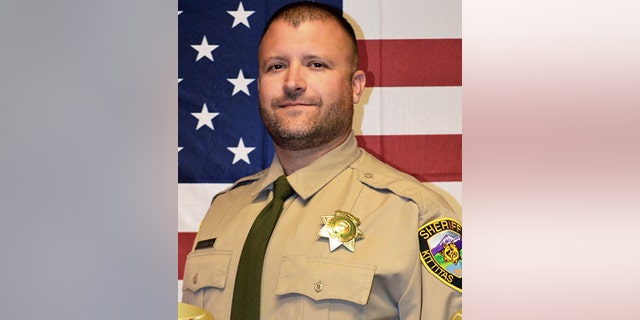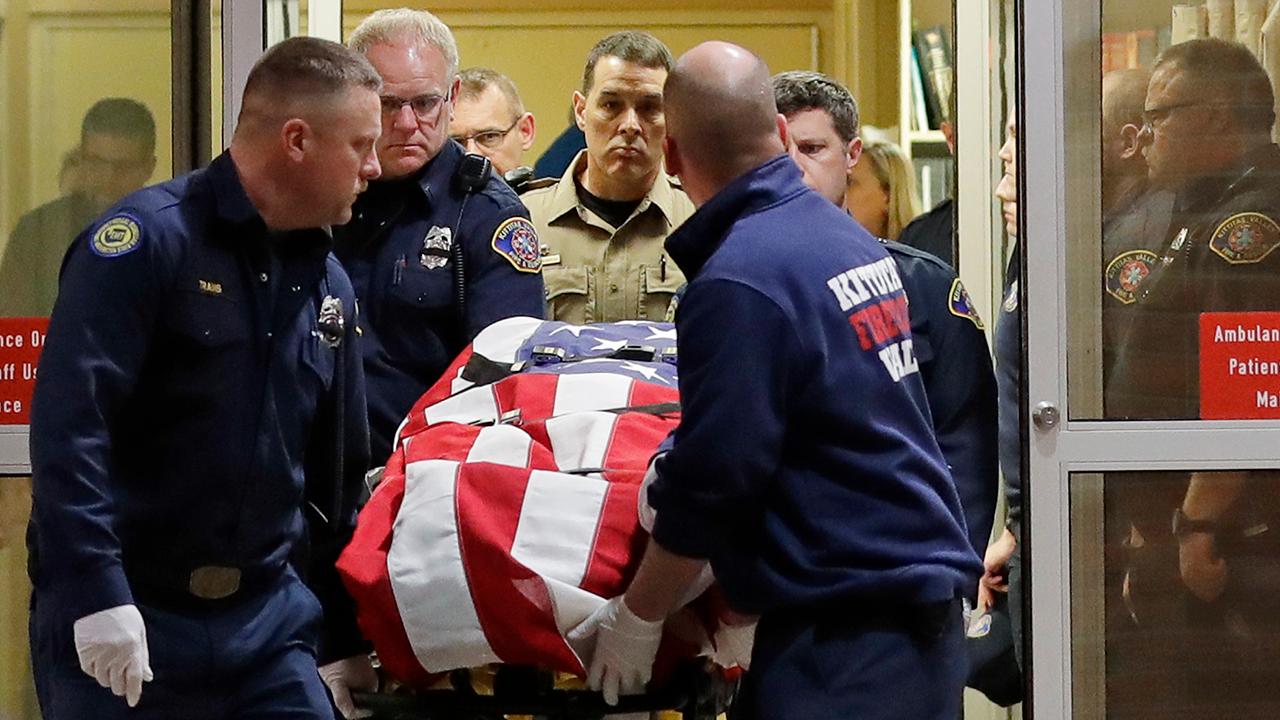Disparate lives collide in San Jose slaying of Bambi Larson
Homicide for which illegal immigrant is arrested shatters neighbors’ sense of safety
Shortly after 4:30 a.m. on Feb. 28, a surveillance camera caught a man walking slowly down a street in the Thousand Oaks neighborhood of South San Jose.
The houses he passed were modest, many ranch-style homes built in the 1960s and 70s and now worth $1 million or more, their front yards neatly groomed, security system signs on almost every lawn.
In the predawn darkness, the man turned into the driveway of a gray house with Japanese maples in front and headed toward the backyard. Then the camera lost him.
Soon afterward, police say, Carlos Arevalo-Carranza, a 24-year-old undocumented immigrant with a trail of arrests and attempts by immigration authorities to get police to detain him, entered the home where Bambi Larson, 59, lived alone with her cat and an aging yellow Labrador retriever. There, according to police, he stabbed Larson to death, leaving her body covered with blood on the bedroom floor.
Several hours later, her body was found by her son and a co-worker, concerned that she had not shown up for work.
The crime shocked the city, stirring an unfamiliar wave of fear in the normally tranquil neighborhood and, after Arevalo-Carranza’s arrest 11 days later, sparking a fierce controversy about Santa Clara County’s policy of ignoring detention requests from Immigration and Customs Enforcement.
It also presented a mystery: How did these two lives, one that of a beloved member of a tight-knit neighborhood, the other a man who lived at the margins of society, in jails and on the streets, somehow collide in a brutal killing.
“This type of homicide doesn’t happen in San Jose,” said Eddie Garcia, San Jose’s police chief. “I can probably count on three fingers the times that we have had a stranger break into someone’s home and brutally murder them.”
A Tight-Knit Block
Soon after George Bisceglia and his wife moved into their home on Knollfield Way 16 years ago, they met a friendly neighbor, Bambi Larson.
Over dinners and glasses of wine by the pool in Bisceglia’s backyard, the three of them became close friends.
“She was always smiling,” Bisceglia recalled. “She just had that beautiful, bubbly personality.”
The families lived on a block where neighbors picked up one another’s children from school and stopped to chat in the street.
Larson could often be seen walking her dog around the neighborhood. When Bisceglia and his wife went out of town the week before the crime, it was Larson they asked to take care of their cats while they were away. They often did the same for her.
Larson’s family members have declined interview requests since her death. In a statement, the family thanked police and asked for privacy.
But the stability of her life seemed a world away from that of the man police say killed her.
A Long Trail of Arrests
He was born in El Salvador in 1994, a few years before Larson moved into her house in South San Jose.
But in 2013, Arevalo-Carranza made his way across the Mexico-U.S border, where he was detained by customs officials. He was held for four months, but once released, he traveled to California and since then has spent much of his life in San Jose.
Santa Clara County public defenders representing Arevalo-Carranza denied requests to interview him at the Santa Clara County Jail and declined comment on the case. At a brief court hearing on Thursday, he did not speak or enter a plea, and his arraignment on a charge of first-degree murder was postponed.
But police reports and court documents from nearly a dozen arrests from 2015 to 2019 suggest a pattern of methamphetamine use, petty crimes and at least one violent felony, committed by a man who may have suffered from serious mental illness and drug addiction. He once told a probation officer he used $40 of methamphetamine each day.
At one point, Arevalo-Carranza lived with a sister in Campbell, according to records. But for much of the time he seems to have been homeless. Before he was arrested, he had been camping near the intersection of Capitol Expressway and Snell Avenue, police said, a little less than three miles from Larson’s home.
According to records of his probation supervision obtained by this news organization, in September 2016, Arevalo-Carranza told his probation officer he had been diagnosed with psychosis and prescribed Risperidone, an antipsychotic drug. In another case, in June of the same year, police reported that Arevalo-Carranza struggled with officers in an abandoned house and “kept yelling at us in Spanish, ‘You devils.’ ”
There is some evidence that his criminal activity may have escalated. In January, a Santa Clara County judge requested that Arevalo-Carranza receive close supervision, according the probation report. The deputy district attorney expressed concerns about the sexual nature of his arrests in Los Angeles, though he was acquitted of a sexual battery charge, and said that one of his felonies in Santa Clara County had “sexual overtones.”
Immigration authorities have said they issued nine requests to law enforcement officials for Arevalo-Carranza to be detained long enough to be picked up by ICE, but the detainers were not honored.
Last week, San Jose Mayor Sam Liccardo, Garcia and Santa Clara County Sheriff Laurie Smith sharply criticized Santa Clara County officials for their policy of ignoring requests from ICE.
“When we have violent or serious offenders that are preying on our community, we must have the ability to protect our residents,” Garcia said.
The county, in turn, blamed the federal government for Arevalo-Carranza’s release, saying immigration authorities did not obtain a warrant, which would have ensured his detention.

A key question about Larson’s murder is whether Arevalo-Carranza’s life intersected with Bambi Larson’s before the early morning hours of Feb. 28.
Garcia said Tuesday that Arevalo-Carranza “stalked” both the neighborhood and Larson before the crime.
Neighbors have speculated that a man they saw in the area on home security videos over the last six months might have been Arevalo-Carranza casing the neighborhood. In mid-January, he was arrested in East San Jose after he was seen standing around near a house’s open gate.
But neither police or prosecutors have said what they believe motivated him to kill Larson.
“We are struggling to find a connection between the suspect and the victim,” Garcia said.
Cameras Were Key
Bisceglia, Larson’s neighbor and friend, was standing on the street with a group of other neighbors on Feb. 28, watching the police activity down the block, when an officer he knew asked if they could view surveillance video from the camera above Bisceglia’s garage door.
On the footage, they saw a man walking east on Knollfield Way, away from Larson’s home, around 5 a.m., about half an hour after the other security video showed him disappearing down her driveway. The man wiped his face with a shirt as he passed by.
In the days following the crime, officers pored through more than 450 hours of video footage, most from homes in the neighborhood, Garcia said. But none showed the man’s face clearly.
Still, the police had other evidence they hoped would help them: three T-shirts discarded in the area around Larson’s home. The T-shirts, police say, had Larson’s blood on them, as well as DNA they believed might belong to the killer.
Ten days after Larson’s killing, on Sunday, Mar. 10, two police officers by chance stopped Arevalo-Carranza about a mile from Larson’s home. They cited him for possession of methamphetamine and released him.
But the next day, when the testing from the t-shirts came back, a law enforcement database matched the DNA to Arevalo-Carranza, police said.
For the second time in 24 hours, the same officers arrested him — this time as a murder suspect. When they did, they found in his possession Larson’s phone and tablet, a knife and boots that matched bloody shoe prints found at the home, and a backpack similar to one seen in security video, authorities said.
Prosecutors have charged Arevalo-Carranza with first-degree murder, with enhancements that could make him eligible for the death penalty.
A Sense of Safety Lost
Residents of Knollfield Way, many of whom have lived on the block for decades, said they always considered their neighborhood safe.
“Break-ins, yes, of course,” said another retired longtime resident, Cathy Bachmann.
But a homicide?
“We haven’t seen anything like this,” said Girma Aweke, an engineer who lives across the street from Larson’s home.

Bisceglia said he has heard from neighbors who have bought cameras or upgraded their security systems since Larson was killed.
Bisceglia said he cannot stop thinking about the night Larson was killed.
“The thoughts that go through your head — they’re horrifying,” he said. “Especially thinking about how terrified she must have been.”
He added that sometimes he thinks, “Why didn’t I wake up at 4:30 in the morning, or whenever it happened? I could’ve been there for her.”
“Even to this day,” Bisceglia said, “I still wake up, and it’s the first thing that’s on the mind.”


